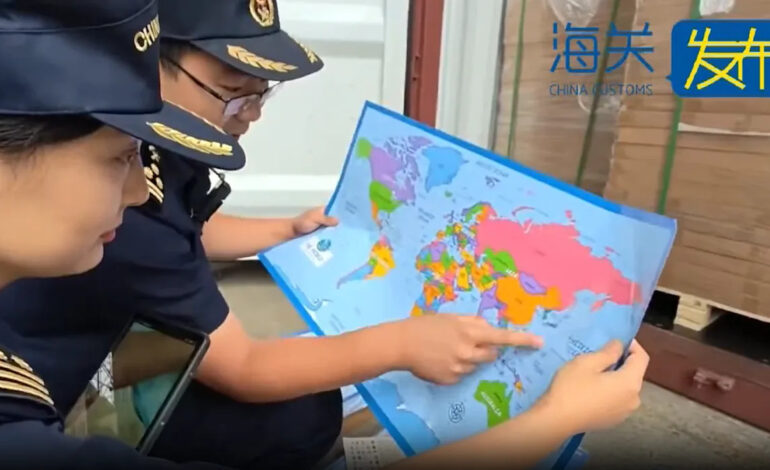China Confiscates 60,000 Maps Over Taiwan Labelling Issues

Chinese customs officials in Shandong province recently confiscated a significant shipment of 60,000 maps that were said to mislabel the self-governing island of Taiwan. Beijing claims Taiwan as part of its territory, and authorities stated that the maps also “omitted important islands” in the disputed South China Sea. The maps, which were intended for export, are deemed problematic for potentially jeopardizing China’s national unity and territorial integrity.
The seized maps failed to include the controversial nine-dash line, a demarcation used by Beijing to assert its claims over nearly the entire South China Sea. This line extends hundreds of miles south and east from Hainan, China’s southernmost province. Additionally, the maps did not indicate the maritime boundary between China and Japan, further contributing to their classification as “problematic.”
China Customs did not specify the nature of the mislabelling regarding Taiwan, which is often portrayed as a sensitive topic in both Chinese and international relations. While China views Taiwan as a part of its territory, the island operates with its own constitution and democratically elected leaders, asserting a distinct identity from the Chinese mainland.
Ongoing Tensions in the South China Sea
The South China Sea remains a hotbed of tensions, particularly with the Philippines and Vietnam, both of which have overlapping territorial claims. Just over the weekend, an incident involving a Chinese ship and a Philippine vessel escalated tensions, with Manila accusing the Chinese ship of ramming and using a water cannon against its government vessel. Beijing countered that the Philippine ship ignored warnings and approached dangerously.
In this complex geopolitical landscape, map depictions often incite controversy. For instance, the 2023 film “Barbie” faced bans in Vietnam and censorship in the Philippines for its portrayal of the South China Sea using the nine-dash line. These incidents highlight the sensitivity surrounding map representations in the region.
Customs Enforcement and Previous Seizures
The recent seizure is part of a broader pattern of customs enforcement against “problematic maps” in China. While the exact destination of the confiscated maps remains unclear, the confiscation of such items is not unusual. In March 2023, customs officers at Qingdao Airport seized 143 nautical charts due to significant errors in national boundaries. Similarly, in August 2023, officials in Hebei province confiscated two maps that featured a “misdrawing” of the Tibetan border.
Goods that do not pass inspection at customs are typically destroyed, underscoring the rigorous enforcement of national standards regarding territorial representations. The large number of maps confiscated in this instance, however, stands out compared to previous seizures and emphasizes the sensitivity surrounding the depiction of territorial claims in international trade.
As China continues to navigate its complex relationships with regional neighbors, the handling of maps and their representations will likely remain a contentious issue. The implications of such actions extend beyond mere cartography, touching upon deeply rooted national identities and geopolitical tensions in the Asia-Pacific region.






